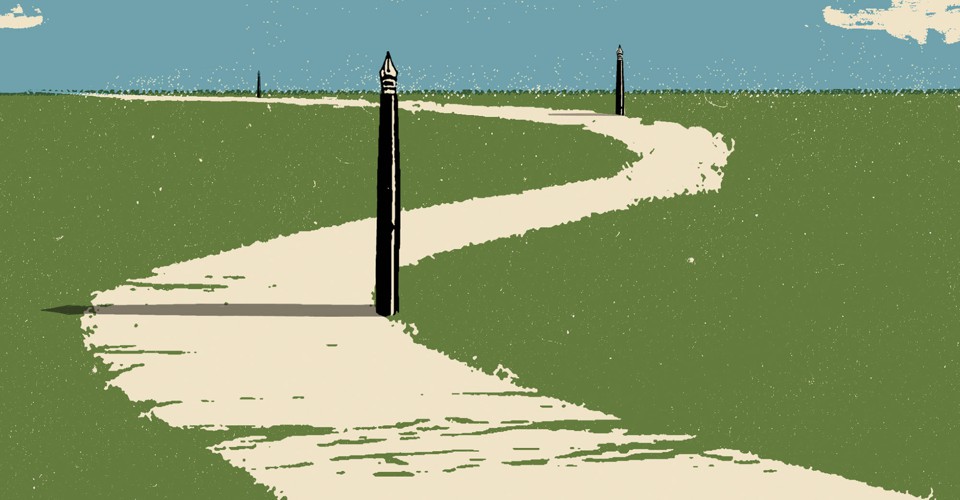The Unbearable Smugness of Walking - 4 minutes read
 Review: Duncan Minshull and Erling Kagge on Walking
Review: Duncan Minshull and Erling Kagge on WalkingBeneath My Feet, though it reaches back to the 14th century, hits its stride in the Romantic period. That’s when walking and writing became inextricably entwined. In a 1902 essay, the critic and biographer (and Virginia Woolf’s father) Leslie Stephen argues that Romanticism, with its sublime visions of the natural world, “was obviously due in great part, if not mainly, to the renewed practice of walking.” It’s easy to picture William Wordsworth—who wrote in his preface to Lyrical Ballads that “the essential passions of the heart find a better soil” in a rustic environment—stomping out The Prelude, his legs serving as his metronome. In an 1822 essay, William Hazlitt writes of how Samuel Taylor Coleridge could “convert a landscape into a didactic poem or a Pindaric ode.” Putting boots on the ground was a way of pledging allegiance to a poetic freedom available only in open space.
Even among writers who soon exchanged the country for the city, the Romantic conception of walking as the essential literary act persisted. The figure of the flaneur, whom Charles Baudelaire defined as a “passionate spectator” of the urban scene, emerged in late-19th-century Paris and produced a literature that turned its back on nature, immersed instead in grime and city steam. Wordsworth aspired to an unshackled imaginative vision, Baudelaire to a voluptuous delirium, but they shared the physical mechanics of literary production: walk, observe, write.
From the May 1883 issue: “The Flaneur,” a poem by Oliver Wendell Holmes
The image of the writer-walker was well enough entrenched by the 20th century that a walk could be consciously undertaken as a literary apprenticeship. In a 1975 reminiscence about New York, the novelist and essayist Edward Hoagland recalls how he stalked the streets of his hometown, first “to smell the yeasty redolence of the Nabisco factory” and then “to West Twelfth Street to sniff the police stables.” The author was inhaling the raw stuff that would fuel creativity: “I knew that every mile I walked, the better writer I’d be.”
Literary walking took on a new political energy at the turn of the 21st century. “Thinking is generally thought of as doing nothing in a production-orientated culture,” Rebecca Solnit writes in an excerpt from her book Wanderlust: A History of Walking (2001), “and doing nothing is hard to do … the something closest to doing nothing is walking.” Viewed from this perspective, a walk is not just good creative exercise. It’s a form of protest against buying and selling, against goal-directed busyness. It’s an autonomous march in opposition to the stream of conformity. And like the slow-food movement, slow-transport literature posits walking as an important part of imagining a more sustainable future.
In his new book, Walking: One Step at a Time, the Norwegian writer and explorer Erling Kagge follows Solnit in highlighting the political implications of walking. Not that his kind of walk remotely resembles “doing nothing.” Kagge is the first person to have completed the Three Poles Challenge (North, South, and Mount Everest) on foot. He’s traversed the New York City sewer system, cultivating “inner silence” along his grueling way and enjoying the familiar litany of inspirational benefits. He celebrates “a healthy stretch of [the] legs, a kick of endorphins,” which evoke meditations unavailable to nonwalkers, who also “don’t notice the wind, the smells, the weather, nor the shifting light” from within their cars. While walking, he feels his thoughts freeing up, “a bubbling between my ears, new solutions to questions that have been plaguing me.”
Source: Theatlantic.com
Powered by NewsAPI.org
Keywords:
Erling Kagge • Romanticism • Essay • Literary criticism • Virginia Woolf • Leslie Stephen • Romanticism • Sublime (philosophy) • Nature • William Wordsworth • Lyrical Ballads • Passion (emotion) • Pastoral • The Prelude • Metronome • Essay • William Hazlitt • Samuel Taylor Coleridge • Didacticism • Pindar • Ode • Poetry • Liberty • Literature • Romanticism • Concept • Essentialism • Literature • Flâneur • Charles Baudelaire • The Spectator • Paris • Grime (music genre) • STEAM fields • William Wordsworth • Unshackled! • Charles Baudelaire • Delirium • Literature • Flâneur • Poetry • Oliver Wendell Holmes Sr. • Writing • Literature • Apprenticeship • Essay • Edward Hoagland • Nabisco • Thought • Thought • Leisure • Culture • Rebecca Solnit • Wanderlust • History • Leisure • Leisure • Point of view (philosophy) • Value (ethics) • Creativity • Protest • Autonomy • Demonstration (protest) • Conformity • Slow Food • Transport • Literature • Sustainable design • Future • One Step at a Time (song) • Norwegians • Exploration • Erling Kagge • Three Poles Challenge • Mount Everest • New York City • Endorphins • Wind • Olfaction • Weather • Light • Ear •